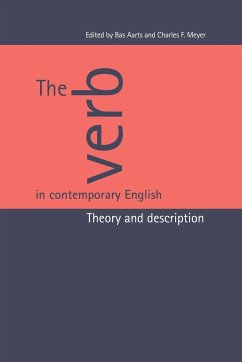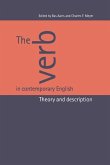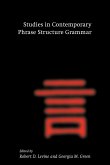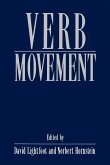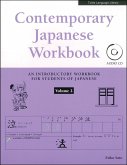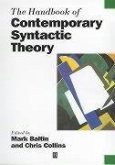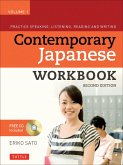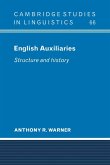Theoretical and descriptive perspectives on the verb in English by some of the top scholars in the field.
This collection of essays by some of the leading scholars in the field sheds new light on the verb in English. The central concern of the volume is to illustrate that verbs can only be adequately and properly understood if studied from both a theoretical and descriptive perspective. In part one, theoretical topics are explored: terminological problems of classifying verbs and verb-related elements, the 'determining' properties of verbs, verb complementation, the semantics and pragmatics of verbs and verbal combinations, and the notions of tense, aspect, voice and modality. In part two, computer corpora are used to study various types of verb complements and collocations, to trace the development in English of certain verb forms and to detail the usage of verbs in different varieties and genres of English.
Review quote:
"This is a book for those interested in the structure and history of verbs in English. It is a varied presentation of current theoretical and descriptive work in English grammar and provides some valuable insights."
Eduardo D. Faingold, Canadian Journal of Linguistics
Table of contents:
List of contributors; Preface; 1. Introduction: theoretical and descriptive approaches to the study of the verb in English Bas Aarts and Charles F. Meyer; Part I. Theoretical Approaches to the Study of the English Verb: 2. Grammatical relations in English Charles F. Meyer; 3. Competence without comp? Richard Hudson; 4. On the semantics of the object I. M. Schlesinger; 5. Secondary predicates in English Bas Aarts; 6. The English perfect as a secondary past tense Rodney Huddleston; 7.'How does this sentence interpret?' The semantics of English mediopassives Andrew Rosta; 8. The expression of root and epistemic possibility in English Jennifer Coates; Part II. Descriptive Approaches to the Study of the English Verb: 9. Find and want: a corpus-based case study in verb complementation Jan Aarts and Flor Aarts; 10. Indeterminacy between noun phrases and adjective phrases as complements of the English verb Geoffrey Leech and Lu Li; 11. Having a look at the expanded predicate John Algeo; 12. 'This scheme is badly needed': some aspects of verb-adverb collocations Stig Johanssen; 13. That and zero complementisers in late modern English: exploring ARCHER from 1650-1990 Edward Finegan and Douglas Biber; 14. Changing patterns of complementation, and concomitant grammaticalisation, of the verb help in present-day British English Christian Mair; 15. Verbs in public and private speaking Jan Svartvik and Olof Ekedahl; 16. Some remarks on comment clauses Anna-Brita Stenström; Index of names; Subject index.
Hinweis: Dieser Artikel kann nur an eine deutsche Lieferadresse ausgeliefert werden.
This collection of essays by some of the leading scholars in the field sheds new light on the verb in English. The central concern of the volume is to illustrate that verbs can only be adequately and properly understood if studied from both a theoretical and descriptive perspective. In part one, theoretical topics are explored: terminological problems of classifying verbs and verb-related elements, the 'determining' properties of verbs, verb complementation, the semantics and pragmatics of verbs and verbal combinations, and the notions of tense, aspect, voice and modality. In part two, computer corpora are used to study various types of verb complements and collocations, to trace the development in English of certain verb forms and to detail the usage of verbs in different varieties and genres of English.
Review quote:
"This is a book for those interested in the structure and history of verbs in English. It is a varied presentation of current theoretical and descriptive work in English grammar and provides some valuable insights."
Eduardo D. Faingold, Canadian Journal of Linguistics
Table of contents:
List of contributors; Preface; 1. Introduction: theoretical and descriptive approaches to the study of the verb in English Bas Aarts and Charles F. Meyer; Part I. Theoretical Approaches to the Study of the English Verb: 2. Grammatical relations in English Charles F. Meyer; 3. Competence without comp? Richard Hudson; 4. On the semantics of the object I. M. Schlesinger; 5. Secondary predicates in English Bas Aarts; 6. The English perfect as a secondary past tense Rodney Huddleston; 7.'How does this sentence interpret?' The semantics of English mediopassives Andrew Rosta; 8. The expression of root and epistemic possibility in English Jennifer Coates; Part II. Descriptive Approaches to the Study of the English Verb: 9. Find and want: a corpus-based case study in verb complementation Jan Aarts and Flor Aarts; 10. Indeterminacy between noun phrases and adjective phrases as complements of the English verb Geoffrey Leech and Lu Li; 11. Having a look at the expanded predicate John Algeo; 12. 'This scheme is badly needed': some aspects of verb-adverb collocations Stig Johanssen; 13. That and zero complementisers in late modern English: exploring ARCHER from 1650-1990 Edward Finegan and Douglas Biber; 14. Changing patterns of complementation, and concomitant grammaticalisation, of the verb help in present-day British English Christian Mair; 15. Verbs in public and private speaking Jan Svartvik and Olof Ekedahl; 16. Some remarks on comment clauses Anna-Brita Stenström; Index of names; Subject index.
Hinweis: Dieser Artikel kann nur an eine deutsche Lieferadresse ausgeliefert werden.

